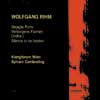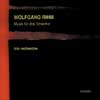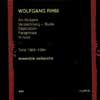Rihm Music for Strings
Three contrasting discs offering an interesting sample from Rihm’s 30-year career – fine performances throughout, including an outstanding one from the Recherche Trio
View record and artist detailsRecord and Artist Details
Composer or Director: Wolfgang Rihm
Genre:
Orchestral
Label: Kairos
Magazine Review Date: 12/2000
Media Format: CD or Download
Media Runtime: 48
Catalogue Number: 0012072KAI

Tracks:
| Composition | Artist Credit |
|---|---|
| Gejagte Form |
Wolfgang Rihm, Composer
Klangforum Wien Sylvain Cambreling, Conductor Wolfgang Rihm, Composer |
| Verborgene Formen |
Wolfgang Rihm, Composer
Klangforum Wien Sylvain Cambreling, Conductor Wolfgang Rihm, Composer |
| Chiffre I |
Wolfgang Rihm, Composer
Klangforum Wien Marino Formenti, Piano Sylvain Cambreling, Conductor Wolfgang Rihm, Composer |
| Chiffre III, 'Silence to be beaten' |
Wolfgang Rihm, Composer
Klangforum Wien Sylvain Cambreling, Conductor Wolfgang Rihm, Composer |
Composer or Director: Wolfgang Rihm
Genre:
Chamber
Label: Kairos
Magazine Review Date: 12/2000
Media Format: CD or Download
Media Runtime: 55
Mastering:
DDD
Catalogue Number: 0012042KAI

Tracks:
| Composition | Artist Credit |
|---|---|
| Musik für drei Streicher |
Wolfgang Rihm, Composer
Recherche Trio Wolfgang Rihm, Composer |
Composer or Director: Wolfgang Rihm
Label: Kairos
Magazine Review Date: 12/2000
Media Format: CD or Download
Media Runtime: 72
Mastering:
DDD
Catalogue Number: 0012 092KAI

Tracks:
| Composition | Artist Credit |
|---|---|
| Chiffre IV |
Wolfgang Rihm, Composer
Recherche Ensemble Wolfgang Rihm, Composer |
| Am Horizont |
Wolfgang Rihm, Composer
Recherche Ensemble Teodoro Anzellotti, Accordion Wolfgang Rihm, Composer |
| Verzeichnung-Studie |
Wolfgang Rihm, Composer
Recherche Ensemble Wolfgang Rihm, Composer |
| Déploration |
Wolfgang Rihm, Composer
Recherche Ensemble Wolfgang Rihm, Composer |
| String Trio No. 2 |
Wolfgang Rihm, Composer
Recherche Ensemble Wolfgang Rihm, Composer |
| Paraphrase |
Wolfgang Rihm, Composer
Recherche Ensemble Wolfgang Rihm, Composer Yukiko Sugawara, Piano |
| In nuce |
Wolfgang Rihm, Composer
Recherche Ensemble Wolfgang Rihm, Composer |
Author: Fabrice Fitch
So why the controversy? When Rihm emerged on the scene in the early 1970s, his reintroduction of expressionistic gestures – grand and sweeping orchestral utterances more reminiscent of the 19th and early 20th centuries than of the late 20th – came as a shock. Subsequently, the rise of what was known in Germany as the ‘Neue Einfachkeit’ (New Simplicity) put Rihm’s position in a broader context; nevertheless, present-day listeners who might be led to expect one sort of neo-tonality or other will be disappointed. So will aficionados of stylistic references left, right and centre: though there is a marked degree of eclecticism in Rihm’s style, he has remained true to the post-Expressionist position from which he started (in fact, most of the features that made his work controversial have been flogged far more energetically since). There are no inside jokes here. Rihm regards composing as a serious business (indeed, too serious at times), and describes it as a struggle of self-discovery. In that sense his aesthetic derives from romanticism. Of course, Rihm, like most artists, hates labels, and I have already trotted out a few.
Briefly, I have nothing but praise for these performances. But the diversity of genres makes comparison difficult. If pressed, though, I would say that the seven occasional trios from the Ensemble Recherche offer a less consistent programme than the other discs. It is not so much the inevitable stylistic diversity of pieces written over a period of 25 years (1969-1994) as their relative unevenness. There are absorbing pieces, such as Am Horizont for accordion, cello and bass clarinet, where pitches individually picked out make for a timbrally stimulating experience. But some of the earlier pieces strike me as diffuse, and the early influence of Stockhausen (in Paraphrase and Deploration) comes across as odd. It seems to me that Rihm is more at ease with a large canvas, either in instrumental or temporal terms, both of which are illustrated by the other two discs.
If pushed to choose a favourite disc, I would hesitate between the other two. In purely musical terms, my choice would go with Klangforum Wien, who make vivid, absorbing listening of four scores from the 1980s and ’90s. The titles emphasise Rihm’s preoccupation with form, and the pieces are related in many ways: Gejagte Form and Verborgene Formen are part of a related series; so are Chiffre I and Silence to be beaten (the latter my favourite piece of the set). All four see the recurrence of stock gestures, whose re- combinations and differing developments can be traced and compared from work to work. It is on this level that Rihm’s invention operates, for the gestures themselves can be quite banal: repeated notes, dotted staccato rhythms high up in the piano’s register, and so on. A particularly striking moment is the two minutes’ near-silence in Silence to be beaten (‘by the conductor’ is understood), when a high string harmonic and slow percussion tremolo from ppp to fff tear through what is an otherwise quite dense, 12-minute score. Not the most original of gestures, again, but their placement within the work gives it an interesting dynamic charge. The music is well worth hearing, and the performances consistent with what I have heard from this ensemble.
But perhaps most striking in interpretative terms is the Recherche Trio’s performance of Musik fur drei Streicher of 1977, a significant early score. Rihm’s use of reminiscences from late Beethoven to underpin the large form (nearly an hour long) has a degree of subtlety missing from those by Hans Zender I reviewed earlier this year (1/00). By its sheer length, this is probably the work that makes the most demands on the listener, and there are undoubted longueurs – but then, that seems to be the point of much of Rihm’s music. The performance has roughness, delicacy, timing, unanimity of ensemble, and a string sound which is a pleasure in itself. Even if my own response to the work is muted, the music elicits a compelling reading from first-rate musicians.'
Discover the world's largest classical music catalogue with Presto Music.

Gramophone Digital Club
- Digital Edition
- Digital Archive
- Reviews Database
- Full website access
From £8.75 / month
Subscribe
Gramophone Full Club
- Print Edition
- Digital Edition
- Digital Archive
- Reviews Database
- Full website access
From £11.00 / month
Subscribe
If you are a library, university or other organisation that would be interested in an institutional subscription to Gramophone please click here for further information.




